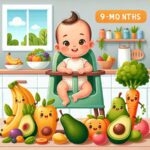Vegetarian pregnancy meal planning is often met with curiosity and concern. How do you ensure you’re getting enough nutrients? Can a plant-based diet meet the demands of pregnancy? As someone who navigated these waters, I’m here to share not just the answers, but also the joy and creativity that comes with vegetarian pregnancy meal planning.
What is Vegetarian Pregnancy Meal Planning?
Simply put, vegetarian pregnancy meal planning involves mapping out your meals to ensure they’re rich in the nutrients essential for the development of your baby, while adhering to a vegetarian diet. It’s about finding a balance between the nutrients you and your developing baby need and your dietary choices and ethics.
My journey into vegetarian pregnancy meal planning started when I discovered I was pregnant. The first thing I did was to research and speak with my healthcare provider to ensure my diet would support a healthy pregnancy. It led me to fascinating insights and delightful recipes that made the journey enjoyable.
Why Choose Vegetarian Pregnancy Meal Planning?
Many opt for a vegetarian diet during pregnancy for health, environmental, or ethical reasons. A well-planned vegetarian diet can provide all the necessary nutrients for both mother and baby. It’s a path I chose for ethical reasons but came to appreciate for its health benefits too.
Vegetarian diets are rich in fruits, vegetables, whole grains, and legumes, offering a wide range of vitamins, minerals, and antioxidants. These nutrients are vital for pregnancy, supporting everything from fetal development to the mother’s health.
How to Ensure a Balanced Diet?
Ensuring a balanced diet during pregnancy means focusing on key nutrients that support fetal development and maternal health. These include protein, calcium, iron, and folic acid, among others. As vegetarians, it’s crucial to find plant-based sources of these nutrients.
Protein needs can be met through legumes, tofu, tempeh, and dairy (if lacto-vegetarian). Calcium is abundant in fortified plant milks, leafy greens, and almonds. Iron can be sourced from lentils, spinach, and fortified cereals, while folic acid is rich in dark green vegetables and citrus fruits. But it’s also wise to consult with a healthcare provider about supplementation, especially for B12 and DHA, which are critical for fetal brain development and might be challenging to obtain from a vegetarian diet alone.
Vegetarian Pregnancy Meal Planning Tips
Planning meals during pregnancy doesn’t have to be daunting. Start by mapping out your meals for the week. Focus on variety to ensure you’re getting a wide range of nutrients. Include sources of protein, iron, calcium, and folic acid in your daily meals.
One of my favorite go-tos was a lentil and spinach curry, packed with iron and protein, served with a side of fortified rice for an extra nutrient boost. Snacking on almonds and fortified yogurts helped keep my calcium levels up, while citrus fruits were my go-to for a folic acid punch.
Yet, personal anecdotes aside, it’s essential to personalize your meal plan based on your dietary needs and preferences. Consulting with a nutritionist can provide tailored advice to ensure you’re meeting your nutritional requirements.
Challenges and Solutions
It’s not uncommon to face challenges while meal planning, such as dealing with food aversions or managing pregnancy symptoms that make cooking difficult. During my first trimester, the mere sight of beans made my stomach churn, a tricky situation given their nutritional importance in a vegetarian diet.
The solution? Flexibility and creativity. I found alternative protein sources, like cottage cheese and eggs, that didn’t trigger my aversions. For times when cooking was the last thing on my mind, having quick, nutritious snacks on hand, like smoothies or whole-grain crackers with hummus, was a lifesaver.
In conclusion, vegetarian pregnancy meal planning is a journey of balance, creativity, and mindfulness towards both your dietary preferences and the nutritional needs of your growing baby. With the right planning and resources, it’s not only possible to thrive on a vegetarian diet during pregnancy but also enjoy the process. Remember, every pregnancy is unique, so it’s crucial to consult with healthcare providers and nutritionists to tailor your meal plan to your specific needs.
For more insights on navigating pregnancy, explore topics like Integrating Montessori Principles in Newborn Care, understanding What to Expect at 6 Weeks Pregnant, or delve into How to Manage Pregnancy Cravings Healthily. Embracing this journey with information and support can make all the difference in your vegetarian pregnancy experience.













